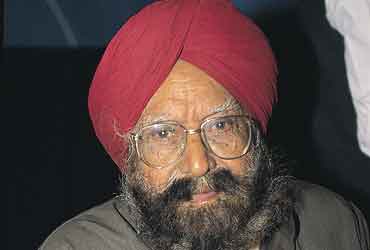The Potrait of a Lady
Introduction
The Portrait of a Lady describes a special bond between grandmother and grandson. Khushwant Singh narrates how the relationship develops over the years, and changes as the grandson grows up and the grandmother grows older. Solitude and silence fill the grandmother's days as she distances herself from the real world. She now prefers the company of the gods and the birds. She enters a world of her own and is content with herself.
About the Writer
Khushwant Singh (February 2, 1915 – March 20, 2014) was an Indian novelist, lawyer, politician and journalist. An Indo-Anglian writer, Singh was best known for his trenchant secularism,[1] his humor, and an abiding love of poetry. His comparisons of social and behavioral characteristics of Westerners and Indians are laced with acid wit. He served as the editor of several literary and news magazines, as well as two newspapers, through the 1970s and 1980s. He was the recipient of Padma Vibhushan, the second-highest civilian award in India. summary
Khushwant Singh draws here an interesting portrait of his grandmother. He presents her as a tender, loving and deeply religious old lady. Singh says that his grandmother was an old woman. She was so old that her face was wrinkled that at the present it was difficult to believe she would ever had been young and pretty. Her hair was white as snow. She had a little stoop in her back. She could be seeing reciting her rosary all the time. The author says that "she was like the winter landscape in the mountains and exponce of pure white serenity breathing peace and contentment."
Source: Click here
Summary of the Text
A picture of author's grandfather was hung on the wall. He appeared too old and it was that he ever had a wife. He appeared to have only lots and lots of grandchildren. Singh was the only child at that time. His parents had gone to live in the city leaving him behind the village under the care of his grandmother. She would get him ready for school. And would also feed him with Chappathi. The School as attached with a temple. All the children sat in the verandah reciting alphabets while his grandmother is engaged reading holy scriptures. Finally in the evening, the author and the grandmother would walk back home feeding the dogs.
After a friendly relationship with his grandmother, he had to adopt a new life in the city. This itself was a turning point for the grandmother and the grandson. Both of them was sent for to settle down in the city with his parents. The author went to an English school but the grandmother never liked the way he was taught. Though Singh and his grandmother shared the same room, she was unable to help him. Apart from this, she was also disappointed that he was learning music that she considered not for gentlefolks. In due course, Singh went up to a University and because of that, he was given a separate room. This indeed made the common link of their relationship snapped down completely. The grandmother agreed the fact and she used to spin the wheel from sunrise to sunset to compensate that. Only during the afternoon she would relax by feeding the sparrows with little pieces of bread. They were her best friends and the sparrows also liked her company.
Later, Singh went up abroad for higher studies which was for 5 long years. He had a doubt in his mind that whether his grandmother may survive or not until he come back. His also taught that it might e the last physical contact between them when she came in the railway station to see him off. After 5 years he came back, incredibly he was welcomed y his grandmother who was not grown a single day older. Singh notices that even at this time when everyone is joyful about his return, grandmother's happiest moments was with her sparrows.
Later in the evening there was a change in her attitude. She celebrated the return of her grandson y collecting some women of neighbourhood and beating drum for several hours. But in the morning, grandmother's health deteriorates and she reveals that she was nearing her end. So she decides that she is not going to waste a single moment by talking so she prayed. Quite suddenly, the rosary falls from her hand and she exhaled her last breath and it was clear that she was no more. After making the preparations for the funeral, the family members went to fetch her body for the last journey. The golden blaze of light of the setting sun glittered her room. And to pay the last homage to the grandmother, thousands of sparrows gathered in and around her room. The sparrows never did cheered nor did they do anything normal. They don't even bother to notice the read pieces thrown at them. Along with her funeral, the sparrows flew away.
Transacting the text
Vocabulary
Puckered: Tightly gathered or contracted into wrinkles or small folds
Serenity: The state of being calm, peaceful untroubled
Monotonous: dull, tedious and repetitious, lacking in variety and interest.
Veritable: Used for emphasis, often to qualify a metaphor.
Bedlam: A scene of uproar and confusion
Rebuke: express sharp disapproval or criticism because of their behaviour or actions
Pallor: an unhealthy pale appearence
Turning point:a time at which a decisive change in a situation occurs, especially one with beneficial results.
Frivolous: not having any serious purpose of value.
Grammar usage
For more information on Primary Auxillaries: http://www.weblearneng.com/main-verb-auxiliary-verb
Assessment
For questions and answers please click here
Additional Resources
To read about other works by Khushwant Singh click here
